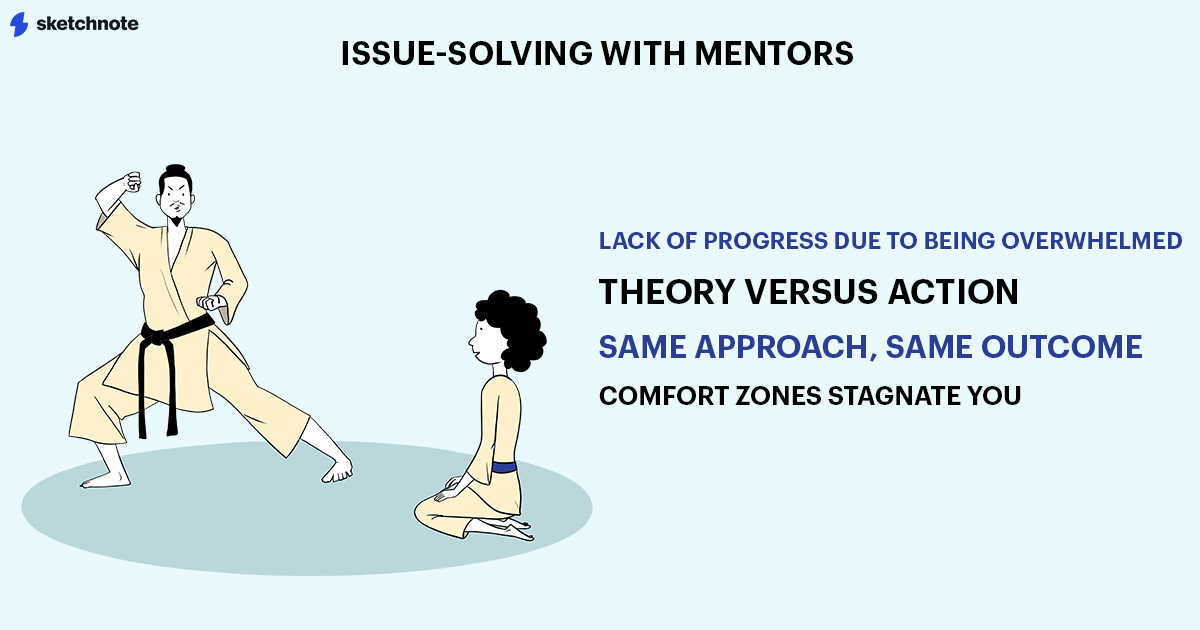From Socrates and Plato to Steve Jobs and Mark Zuckerberg—mentor-mentee relationships have been vital to passing on knowledge and expertise for years.
Many great historical figures have had a mentor standing behind them, guiding them to the right path with their experience. This holds true for the business world too. In fact, many flourishing entrepreneurs swear that the strength of the mentor-mentee connection is what can make or break the chances of the startup's success.
Why are mentors important for entrepreneurs and startups?
Establishing a startup and trying to run it successfully is a risky proposition at any stage of an entrepreneur's life. The rewards are high, but so are the perils on the way to success. In situations like this, having someone to gently steer you in the right direction when you may lose your way, or simply answer questions you may have is a valuable prospect.
On the outside it may look like having a mentor is just a small, inconsequential aspect of the bigger startup journey. However, think of a mentor as the trusty guide who has scaled Mount Everest before, helping you reach the summit by showing you the right path. That's what it means to have a mentor in the world of entrepreneurship, where more startups will likely fail than succeed.
Having mentors has been proven to be a significant factor in business success. Research conducted by Sage shows 93% of the startups globally admit that mentorship plays a great role in entrepreneurial success.
Here's a stat to put things into perspective. While 30% of newly established companies may not survive the first two years, an astounding 70% of startups that participated in a mentoring program can survive in the market for more than twice that time—an average of 5 years.

Why do you need a mentor?
Mentors—in the startup context—act as guides during the entrepreneur's journey to achieving a specific goal. Although founders have a plan for their startup, and consistently work to achieve the blueprint's objectives, it's vital to have an external actor who can provide an objective and experienced opinion, thereby helping uncover cognitive biases.
One of the most significant contributions of a mentor is to help founders see the tendencies and shortfalls they commit and may have been unaware of. These can be big liabilities that could stunt the growth of a startup prematurely, not allowing the founders to progress too.
No matter how prepared you are as an entrepreneur, the power of experience is unmeasurable. A mentor is an excellent source of lessons that can only be learned by going through the same troubles the founder knows all too well.
But that's not all. Having a mentor by your startup's side can be beneficial in more ways than one. Learn more about how your mentor can help boost your business by checking out this quick lesson on Sketchnote.
The benefit mentors bring to startups
Personalized advice from an unbiased professional
Mentors have truly been there and done that. These experts possess a great amount of knowledge in the field of creating and growing businesses. Conventional learning methods can only get founders this far. Mentors can enlighten entrepreneurs with their wisdom, which has been earned through experience.
Specifically, one great benefit mentors carry is giving entrepreneurs personalized advice for their projects. The specific suggestions based on the issue at hand, the situation, and immediate problems cannot be found in a book.
Besides, given a rapport created with the mentor, the founder can be assured that the advice is—at all times—truthful and impartial. They can trust that the guidance is given with the genuine intention of helping their business succeed.
Opportunities to grow business contacts and network
Mentors don't become mentors overnight. They have a deep connection with the world of business and even deeper networks. Mentors have been involved in the field you're in for a long time and have contacts with other professionals in the industry, who could potentially support your business.
The longer you work with your mentor and the more you nurture your relationship, the bigger the chances of growing your network too. Expect to be introduced to newer people and open doors to newer collaboration, as well as future opportunities.
Of course, networking and building relationships with other industry professionals is a must for any successful entrepreneurial endeavor. And you can rely on your mentor to ease things a bit here by helping you tap into their own network.
Mentors are a source of motivation and support
Trusting your project is absolutely necessary to achieve success, but so is having confidence in yourself as an entrepreneur.
Having a mentor who has faith in your idea and sees its potential is a huge plus. This is an overlooked aspect of finding a trusted person to rely on, especially considering how maintaining your self-confidence can often be what makes or breaks a startup.
Studies back this up too. A mentor figure is said to have a significant positive effect on young entrepreneurs’ success.
On the flip side, when you go through a tough time with failures or lack of motivation, mentors can encourage you to keep your head up and continue moving forward. With a guide around, founders won't resort to giving up when overwhelmed with the consequences of decisions. The mentor will help you with the right steps to follow after a fall.

Help with investment
Quite like networking, mentors are prompt to help their mentees find new funding opportunities. Having an intro from a trusted name in the industry is extremely invaluable, and your mentor can help propel you into the orbit of just the right people who may want to invest in your project.
In some situations, mentors may even decide to fund part of your project themselves. However, keep in mind that this should not be a requirement of your mentorship partnership. If such an arrangement does work out with your mentor, think of it as a bonus!
Introduction to new methods and strategies
A good mentor knows it's not a one-size-fits-all world.
This means that they know that the strategies that worked for them may not necessarily work for you. When mentors value their mentees, they will often propose new strategies and plans of action entrepreneurs can apply, when facing specific circumstances. In this entrepreneurial process, both actors are involved and heard out.
A business mentor will often have the ability to discern your existing good practices from the newer methods and strategies they can teach you. With their guidance, your mentor can boost the efficacy of your steadfast decisions.
If all goes well, this combination will lead to the development of an essential skill an entrepreneur must master—improving their problem-solving abilities.
But this isn't the only skill a good mentor will help an entrepreneur develop.
Skill development
As we mentioned before, joining a mentoring program will help you develop many, many skills. From improving your communication abilities to correctly applying your leadership skills, a good mentor will guide you in refining your current expertise and developing new ones you're sure to need as your career progresses.
These skills have long-term benefits that will help you for the rest of your career. So its value is immeasurable.
Confident decision-making
At some point in their career, all entrepreneurs have faced situations that have required them to take tough calls.
Being able to rely on your mentoring relationship for advice and support through taking these difficult decisions is an extremely valuable relationship. Armed with an expert, startup founders can learn how to differentiate between good and bad decisions, building their self-confidence when faced with these situations in the long run.
Maximize your business performance
The bottom line here is that having a good mentor-mentee relationship will help you not just refine your skills but also have you learn the best strategies to maximize your startup's performance.
A good mentor by your side can help guide you through each step of this process and assist you by giving first-hand advice.
It's not much of a reach to say that leveraging all the opportunities of a mentoring program can be the difference between having a successful startup and not being able to survive the first years on the market.

Issues that a mentor solves for startups
While mentors exist to assess the existing issues of your company in detail and analyze the best way to solve those problems, there are also general issues they can help founders avoid.
By participating in these mentorship programs and having a mentor by their side, entrepreneurs can avoid facing challenging situations and their consequences. Like:
Lack of progress due to being overwhelmed
Inexperience is an extra stressor for founders since every situation is new, and every problem is unknown. It's very easy to get lost in the issues and not know how to proceed.
These situations almost always take a toll on entrepreneurs, and subsequently their business performances. Eventually, it can lead to the startup's failure.
By participating in mentorship programs, founders can access the advice and experience of not just their mentors, but other mentees who have faced similar issues. Collectively, they can guide each other through difficult times and avoid getting stuck in a rut.
Theory versus action
We've established already that entrepreneurs are—more often than not—well-prepared individuals.
And while theoretical knowledge is an important tool, it means pretty much nothing if it's not followed by action. But that's easier said than done with founders. You often know what to do, but not how to do it.
This is where a mentor comes in and can help you.
Mentors can help you take all your theoretical knowledge and apply it in a practical way directly to your business. They guide you through the correct steps to achieve your goals.
Same approach, same outcome
Sometimes, startup founders end up facing recurring issues—one after the other. They face a problem and manage to fix it, only for it to appear again, requiring another fix.
New entrepreneurs don't necessarily have the right tools to fix this problem differently. They end up getting stuck in a continuous cycle of repeating the same actions and getting the same outcomes.
When you're exposed to a mentor's new perspectives and approaches, it helps break the cycle which may be holding your project back from evolving correctly.
Comfort zones stagnate you
We talk a lot about how mentors help their mentees when things are going wrong. But what happens when everything is going as planned? In such situations, mentors also play a significant role in keeping their mentees active in their quest for success.
When startups achieve their first goal, founders may start getting comfortable in their standing, and maybe even complacent. They might also get stuck and not push forward to achieving newer, more significant goals.
That’s why mentors act as a force to push and motivate entrepreneurs by keeping them continuously challenged, being a motor to the project’s growth.

Famous examples of mentors that brought benefit to a startup
A good mentor-mentee relationship has been the cornerstone of the success of some of the most powerful entrepreneurs in the world. Many big names in the world of tech and business have been eager mentees and learners at some point in their careers, and credit their mentors for a positive impact on their success stories.
Here are some of the most fruitful mentor-mentee relationships in modern business history:
Larry Page and Sergey Brin, mentored by Bill Campbell
Larry Page and Sergey Brin are the famous founders of Google. However, when they started out, they were just two computer scientists with a great project at hand, unaware of the impact their company would have, and how fast they would grow.
As computer scientists, they weren't too comfortable with business and quickly realized the need for external help. They needed support to keep up with how fast Google was scaling, and how to correctly deal with running a company.
Bill Campbell guided both founders during the creation and growth stages of the giant Google. He even taught them how to implement different strategies that still stand as regular practices in the company, such as the “trip report”.
This communication practice consists of starting meetings with an open question to everyone, asking them how their weekend was. It might sound like a simple pointer, but this effective advice allowed the team to create better interpersonal relationships, as well as get everyone in a good mood to start their meeting positively. This helped staffers become more open-minded and effective.
Campbell, their mentor, is also considered to be Silicon Valley's most influential business coach. His teachings are part of the culture of some of the biggest companies today like Apple and Facebook, besides Google.
Steve Jobs, mentored by Mike Markkula
Mike Markkula is a businessman and angel investor who guided Steve Jobs in the beginning stages of Apple. Markkula even helped the project by investing a great amount of money into Apple, as well as overseeing the development of the first few products.
Both Jobs and Steve Wozniak, Apple's founders, have been quoted hailing the presence of Markkula in the company. They've said on multiple occasions that it was having Markkula as a mentor that made Apple a successful company.
Mark Zuckerberg, mentored by Steve Jobs
In a classic case of a good mentee becoming a good mentor, Jobs guided Mark Zuckerberg when he hit a rough patch with Facebook. It was around then that there were many who became interested in acquiring Facebook.
Jobs helped Zuckerberg reconnect with his idea and vision, giving him the confidence to continue pushing through adversity.
While this was an informal relationship, both tech giants have spoken about the importance it had for them, and how much Jobs' guidance helped the Facebook founder over the years.
Sir Richard Branson, mentored by Sir Freddie Laker
Sir Richard Branson, the founder of the Virgin group, is a notable example of how incredibly important the figure of a mentor is for startups.
The Englishman was struggling to get his project—Virgin Atlantic airlines—off the ground in the early days. And while it hurt his ego, Branson had to admit that he needed a mentor to help him. And that mentor was airline engineer and airways entrepreneur Sir Freddie Laker.
Branson has famously said that the most valuable thing his mentor did for him wasn't just to teach him how to be successful, but also how to fail and learn from it. Branson also added that he wouldn’t have made it into the industry without his mentor.
Bill Gates, mentored by Warren Buffet
When Bill Gates was working on developing Microsoft, one of his most remarkable characteristics was his unwavering belief in himself and his idea.
So much so that at first, he was reluctant about receiving any kind of mentorship. However, when he met with Warren Buffet, they realized how much they could accomplish together by building a business relationship.
Buffet advised Gates in many instances when things became complicated, even teaching him the importance of long-term thinking and strategy.
And the rest, well, is history!



